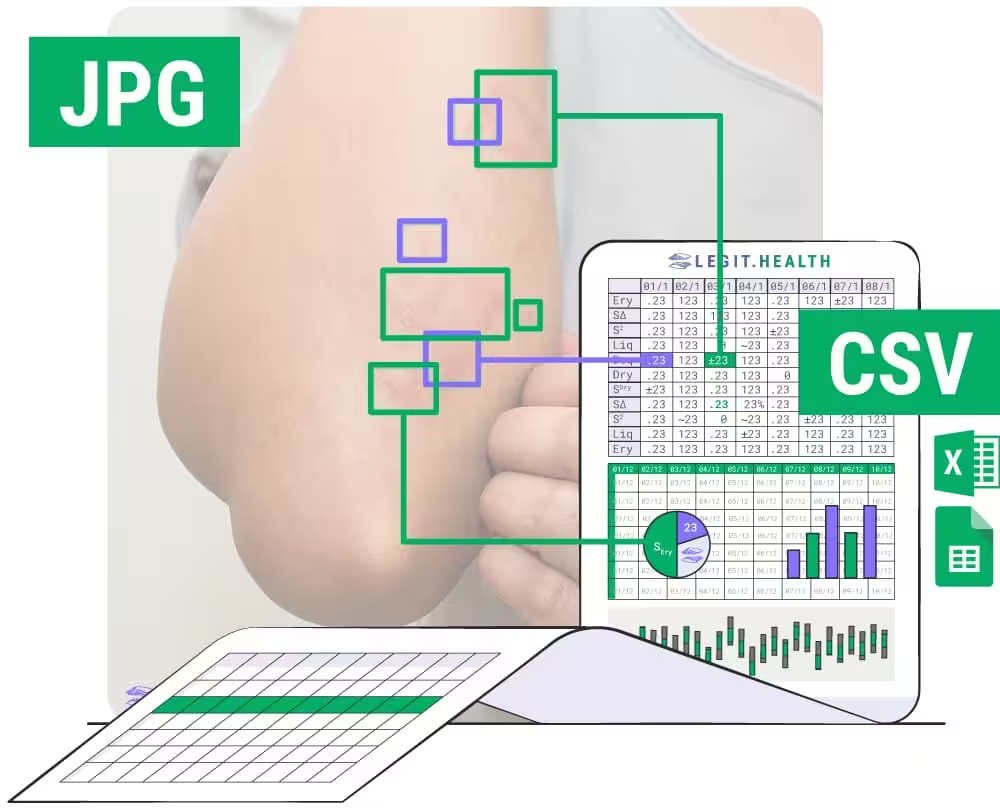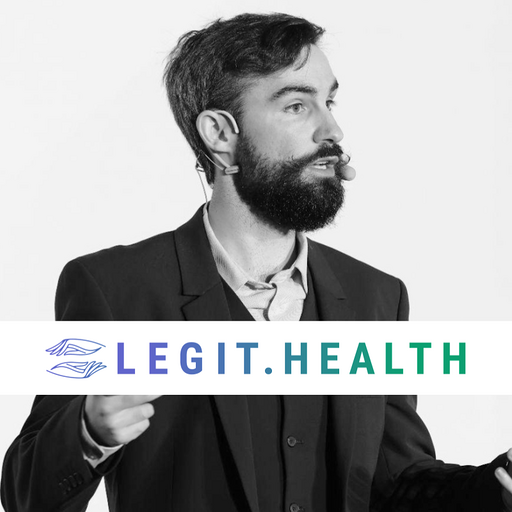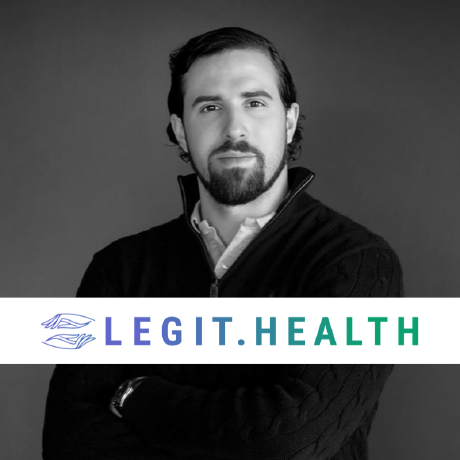7 proven ways of enhancing clinical trials thanks to Legit.Health
Introduction
Clinical trials are the engine that pushes forward medical science. What comes out as obvious is that the tools at the disposal of those at the forefront of progress should be as advanced and cutting-edge as the research that is been worked on.
The research that will propel us to the future shouldn't take place using tools of the past, especially if there are new tools that increase the reliability of outcome measures.
Legit.Health takes up the challenge of providing researchers with a modern, useful and reliable tool for their clinical trials by incorporating deep learning algorithms and image analysis technology into an easy-to-use and well-designed interface.
Clip extracted from the event IOT Solutions World Congress organised at Barcelona on Feb 12, 2023.
How does Legit.Health improve clinical trials?
A good way of understanding how Legit.Health's technology can be implemented into clinical research for drug development is watching Diego Herrera's explanation. Diego is the Director of Clinical Data & Digital Innovation at Almirall.
As Diego Herrera explains, sponsors of dermatological clinical trials face many challenges:
- Investigators must manually quantify skin lesions, which is difficult and time-consuming.
- Local skin reactions are subjectively evaluated, resulting in high variability in measures of the intensity.
- Tedious efforts for the investigator, which leads to lower adherence and a higher risk of error.
- Lack of standard conditions for clinical observations
- Clinical investigators find it difficult to measure with accuracy the area where a treatment has been applied, especially in the long term.
However, Diego also explained the opportunities that AI digital photography brings to the table. Diego thinks of the opportunities as two main groups: efficiencies, and increasing the quality of data:
- Efficiencies
- Enabling teledermatology and remote data capture
- Robust digital and transparent documentation during the study
- Time-saving during the clinical assessments
- Increasing quality and robustness of data
- More precise location of the treatment area
- Automatic calculations of the skin lesions
- Introduce novel endpoints based on digital photography measurements
You can watch Diego's presentation at a technological congress in Barcelona:
Clip extracted from the event IOT Solutions World Congress organised at Barcelona on Feb 12, 2023.
Real-world problems we can help with
The sponsors and the CROs we work with consistently find that our technology helps in certain areas.
- Make it easier to recruit sites by reducing the workload of investigators, especially in filing scoring systems.
- Minimise risks in training sites, whilst increasing speed in training and reducing reporting errors.
- Ensure quality of data by performing an image quality check and reduce inter-observer variability in scoring systems by standardising the measurement.
Thanks to this, Legit.Health helps effective therapies to reach patients faster by increasing both the quality and quantity of endpoints in any given study, greasing the wheels of science so the process of determining the efficacy of a new world-altering drug is as easy as possible for the investigator, the CRO and the sponsor.
Capabilities of the software
![[object Object]](/img/px2csv.avif)
Px2Csv
Pixel-to-CSV conversion
Turns the visual information detected by algorithms and the metadata of the image into rows of data, that can be exported into CSV, Excel, JSON or any other spreadsheet solution.
![[object Object]](/img/automatic-severity-scoring.svg)
APROM algorithms
Automatic Patient-Reported Outcome
Automatically fill in most of the clinical scoring systems, by looking at visual signs contained in images, such as desquamation, dryness, erythema, surface, lesion count, and so on.
![[object Object]](/img/match-inclusion-criteria.svg)
MIC Algorithms
Match Inclusion Criteria
Automatically screen patients and include or exclude cases that do not fit the protocol's inclusion criteria, either because the condition is not present - or the severity is too high or too low for the study.
![[object Object]](/img/quality-check-robot.svg)
DIQA algorithms
Dermatology Image Quality Assurance
Automatically check images right when they are taken and ensure that they have enough quality for them to be useful. If an image has a mistake, DIQA prompts the user to fix that specific issue.
![[object Object]](/img/melanoma-artificial-intelligence.png)
ACA Module
Adverse Condition Alerts
Scans the images taken by patients for conditions flagged as adverse. For instance, malignancy and pre-malignancy. If an adverse condition is detected, it alerts the researchers.
![[object Object]](/img/match-inclusion-criteria.svg)
Patient-support app
Life Quality and Burden of Disease
Allows the gathering of PROMs such as DLQI, and more specific life quality indexes such as CU-QoL, AKQoL, and many more. It also accepts custom questionnaires with a form builder.
Screen capture of an application using Legit.Health's technology.
In this particular example, the AI automatically counts all acne lesions with great precision, measures the severity by applying the formula of the scoring system and allows the investigator to supervise and correct the output, when needed.
Do you want to see the clinical AI technology in action?
The best tool for decentralized clinical trials (DCT)
As COVID-19 began to spread around the world, research centres and pharmaceutical companies conducting clinical trials had to quickly adopt remote data collection technologies and processes to keep patients safe and clinical trials running.
One of the biggest challenges for these new types of clinical trials is to be compliant with the current regulations, while keeping the patient more engaged than ever to obtain accurate and reliable data. Luckily, Legit.Health has developed the perfect tool to overcome these challenges.
Being able to be plugged into any established DCT management software such as Medable or Apple ResearchKit, Legit.Health is the prime APROM (Automatic Patient-Reported Outcome Measures) tool in the market, as it allows its users to run an efficient decentralized clinical drug development and enables screening at a larger scale.
7 ways of powering clinical trials
1. Prevents low-quality images
In decentralized clinical trials or studies that require photographic evidence of the patient's recovery process, faulty or low-quality images can hinder the progress of the study.
Legit.Health's revolutionary image quality assurance algorithms increase the overall quality of the recorded images by turning an ordinary smartphone into a clinically reliable image capture device, enabling decentralized clinical trials and empowering the patient to report on the condition autonomously.
This novel deep learning algorithm achieves this by checking the quality of the image before considering it for the trials, and, upon detecting a quality drop or a problem, prompts the user to fix it before taking another picture.
2. Higher reliability thanks to Automatic PROMs algorithms
Legit.Health's next-generation algorithms are able to automatically fill in most of the clinical scoring systems by analysing symptoms visible in pictures such as desquamation, dryness, erythema, affected area or lesion count, among others.
This not only reduces the possible errors of reporting, but also makes the job of the Data Manager easier, as most of the gruelling routine work becomes automated.
In addition, the algorithms provide higher reliability and greater accuracy in data collection, since there is no time difference between the recording of the lesion and its actual condition, and significantly reduces both the inter-observer and intra-observer variability.
Lastly, the assistance of the machine makes scaling the trials trivially easy, as it bridges the gap between languages, countries, or even brands.
Do you want to see the clinical AI technology in action?
3. Automatically check protocol inclusion criteria
The algorithms will automatically exclude patients who do not fit the protocol's inclusion criteria, either because the severity is at odds with the goals of the study or because the condition does not match the trial.
This allows online patient recruitment to become a viable option, thus expanding the potential pool of patients available for clinical trials.
Additionally, the revolutionary diagnosis assistance algorithms of Legit.Health will detect any situation that might be deemed adverse, such as a disease with a high probability of scaling up or a lesion that may present malignancy, and will report to the researchers that the patient needs medical attention.
4. Helps researchers extract all the information from a picture
One of the biggest constraints of any clinical trial, especially one run remotely, is how time-consuming it is to analyse every image and the expertise needed to turn a picture into actual user data. This becomes apparent when you consider the usual schedule of a doctor and how little time they have to devote themselves to data entry tasks.
Legit.Health's technology turns automatically any dermatological picture into raw data, extracting the information hidden in the pixels and turning it into values such as redness, area, severity, dryness, desquamation, and many more.
This translates into a significant reduction in the workload for the data manager since this process is automatic, as well as to greater reliability of clinical endpoints at a decreased cost. The absence of any human bias in the algorithms zeroes out the intra-observer variability.
Additionally, this will suppose a massive expanse in scope to clinical trials. Up to the present time, most researchers limit themselves to a couple of endpoints in any given study, as they have to balance the needs of the research with the budgetary and time limitations.
Visual explanation of pixel to csv (px2csv) algorithms
Thanks to Legit.Health, measuring 100 variables costs the same as measuring 2, which exponentially increases the number of clinical endpoints and allows researchers to achieve greater granularity in their data.
Do you want to see the clinical AI technology in action?
5. Ensures a roboust Data Transfer Protocol
Legit.Health is committed to advancing pharmaceutical research by providing top-tier data transfer services. Our protocols are robust, our technology is advanced, and our dedication to your trial's success is unwavering. Trust us to handle your clinical trial data with the utmost care and professionalism.
Secure Data Transfer Mechanism
We've moved beyond the conventional email transfer methods. Our secure channels utilize the latest in encryption technology, safeguarding sensitive data beyond typical standards. This means that every piece of data transferred is protected against unauthorized access, ensuring that patient confidentiality and trial integrity are never compromised.
Optimized Data Format
The .CSV file format is universally recognized and easily accessible. By employing this format, we ensure that the data we provide can be seamlessly integrated with your existing data management systems, facilitating straightforward data analysis and interpretation without the need for complex conversions or additional software.
We also offer other data formats such as JSON and XML. These are generated programmatically to remove the risk of error and provide agility and availability.
Robust Data Structure
Every clinical endpoint is critical, which is why our data structure is meticulously detailed and tailored according to your protocol. From lesion measurements to severity scores, we capture all relevant data points with precision, ensuring comprehensive coverage of the clinical endpoints you need to monitor.
The following table shows an example of the data our device may provide. Each row represents a variable recorded in the data transfer file.
| Name | Label | Format | Length | Example |
|---|---|---|---|---|
| Study_ID | Protocol ID | CHAR | 40 | A-232323_BH |
| Site_ID | Site ID | CHAR | 8 | 2323 |
| Patient_ID | Subject ID | CHAR | 8 | 2323-23 |
| Date | Date performed | CHAR | 10 | DD-MMM-YYYY |
| Time | Time performed | CHAR | 5 | HH:MM |
| Report ID | Report UUID | CHAR | 50 | 0188d3e9-4bf0-7d7d-9904-aec1d69f3e7d |
| Image ID | Image ID | CHAR | 50 | 232323_0210037_Week12.jpg |
| Type | Lesion Type | CHAR | 20 | Nodule |
| Px2cm | Conversion from pixels to cm | CHAR | 20 | 0.32 |
| Quality_score | Numeric value that represents the quality of the image | CHAR | 20 | 75, 80 |
| Nodule | Quantity of nodules detected in the image | CHAR | 20 | 1, 2, 3 |
| Abscess | Quantity of abscesses detected in the image | CHAR | 20 | 1, 2, 3 |
| Draining tunnel | Quantity of draining tunnels detected in the image | CHAR | 20 | 1, 2, 3 |
| Size of the lesion | Size of the bounding box that defines the ROI of the target lesion | CHAR | 20 | 23.12 |
| Severity_score | Numeric value that represents the severity of the condition according to the IHS4 score | CHAR | 20 | 5, 6 |
Please note that this is a simplification, as an actual data transfer file may contain more than 50 rows.
Blinded Data Transmission
To maintain the integrity of the trial and to ensure an unbiased analysis, we can accommodate blinded data transmission. This service is provided upon request, ensuring that the efficacy of the investigational product is accurately assessed, free from any potential bias.
Adaptable Transfer Frequency
The dynamic nature of clinical trials demands flexibility. That's why we offer customizable data transfer schedules that can be adapted to the specific milestones and needs of your trial. Whether it's monthly intervals or on-demand requests, our protocol is designed to provide the data you need when you need it, without any unnecessary delays.
Offer flexible scheduling tailored to trial milestones and sponsor needs, ranging from monthly to on-demand data delivery.
6. Encourages patient to adhere to the protocol
Legit.Health's revolutionary approach to clinical trials does not only rely on cutting-edge algorithmic technology to do all the heavy lifting. Its slick design, focused on ease of use and readability, considers the day-to-day realities of the patients to help them adhere to the protocol of the clinical trial.
By creating tasks for the patient, providing them with alerts and reminders, rewarding their reporting with principles extracted from the ideas of gamification or providing them with useful information about their disease, Legit.Health increases patient adherence, enriches endpoint diversity and enables patient-centric clinical trials.
7. Includes quality of life and customised questionnaires
Legit.Health seamlessly incorporates the main life quality indexes such as DLQI, CU-QoL or AKQoL, among others, allowing the clinical trials to enrich the data they collect and give it texture, as well as provide it with additional context.
This supposes no extra work for the researchers, as the app has both the questionnaires and the accessibility to interpret that data built-in, so researchers don't need to add any step to the data collection process.
Get access now
This free 23-day trial of Legit.Health gives clinics and hospitals a hands-on look at how to drive increased adherence and improve patient outcomes, as well as improving efficiency and overall quality of life.

